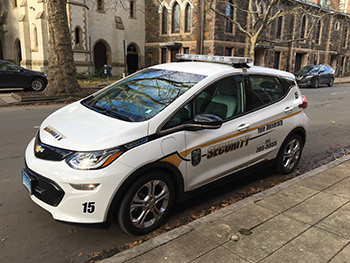Yale’s Fleet is going green one vehicle at a time. Its latest addition is a 2017 all-electric Chevrolet Bolt that is being used as a patrol vehicle at West Campus. The Bolt joins an overall campus fleet that now boasts 27 alternative-fuel vehicles including CNG (compressed natural gas) and propane-powered transit buses and facilities trucks.
In 2002, Yale had only two alternative fuel vehicles in its fleet. The steady yearly increase is due to the painstaking, yet diligent efforts of George Longyear and Ronald Gitelman of Yale Fleet Management. “We are determined to double the amount of green vehicles we currently have in our fleet by 2020,” said Longyear, Director of Yale Fleet & Housing. This lofty goal supports the University’s overall sustainability strategy. However, alternative fuel vehicles are not available for all campus uses—such as carrying heavy tools and equipment. Also, it is not always easy to convince departments to take the chance on new technologies and that may have higher upfront costs than traditional options.
The Yale Fleet Management team supports 41 departments and 472 vehicles–ranging from sedans to large shuttle buses, to police motorcycles and mid-sized hospitality box trucks. They provide Yale departments with resources and accessible online tools to assist departments in managing their cars, vans, and trucks. Vehicle purchases must go through Yale Fleet, and they work closely with departments to discuss the value and practicality of purchasing alternative-fuel vehicles. The process is slow, but every year more sustainable cars and trucks are added. “The goal is to utilize alternative-fuel vehicles that are environmentally responsible and take into account budgets, but not just focus on cost,” said Longyear.

Yale Fleet is installing two electric charging stations at West Campus and is looking to add more on Central Campus. In the meantime, the Bolt is recharged via a regular electric outlet. Currently, there is a charging station at 344 Winchester and an additional 11 charging stations in various Yale parking lots that both departments and employees can use. While the Fleet team continues to work with departments to consider alternative fuel vehicles, they also look to the industry for trends and new technologies in addition to looking at the current fleet and ways to make those vehicles greener.
Another successful program in place looks to retrofit vehicles already in house using an XL3 Hybrid Electric Drive System. This system can be upfit to 24-passenger buses and improves fuel economy by 23% and reduces CO2 emissions per vehicle. The bi-fuel propane and gasoline-powered transit buses and facilities trucks exhibit fuel efficiency, lower emissions and less maintenance (i.e., fewer oil changes.)
Yale Fleet can track vehicle performance with the supplier’s XL Link cloud-based analytics system, which measures and reports on MPG (miles per gallon) performance using a continuous data link from the vehicles. “We are looking to do electric vehicles where we can and where practical and use alternative fuels for all other vehicles as needed,” said Longyear.
Yale Facilities has the largest number of vehicles on campus, so Yale Fleet is working with them and looking for opportunities to make their mini-fleet greener. “Our approach is a mixture of 3 basic technologies: all electric, hybrid and alternative fuel. Roughly 17% of the university fleet is alternative vehicles” said Longyear.
All this hard work does have its rewards. Yale Fleet continues to be recognized for its sustainability efforts. It was the recipient of an Environmental Leadership Award from the National Conference of State Fleet Administrators and was recognized by the Northeastern Clean Cities Coalitions for its efforts to cut emissions, reduce fuel use, and promote alternative fuels. Recently, they received a Green Fleet Award honorable mention from the “100 Best Fleets In North America.”
By Lisa M. Maloney, Yale Communications Officer